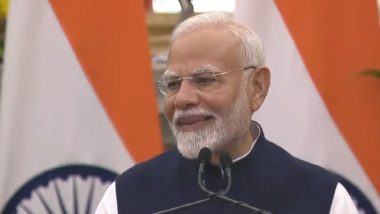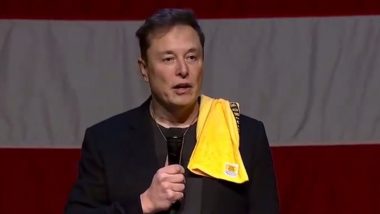Brussels, Feb 4 (AP) The European Union on Tuesday rejected US President Donald Trump's proposal for securing peace in the Middle East and expressed concern about Israel's plans to annex more Palestinian land.
Trump's plan, which was unveiled last week, would foresee the eventual creation of a Palestinian state, but it falls far short of minimal Palestinian demands and would leave sizable chunks of the occupied West Bank in Israeli hands.
In a statement, EU foreign policy chief Josep Borrell underlined the bloc's commitment to a two-state solution, based along the 1967 lines, with the possibility of mutually agreed land-swaps, made up of the state of Israel and "an independent, democratic, contiguous, sovereign and viable state of Palestine."
Borrell said the US initiative "departs from these internationally agreed parameters."
"To build a just and lasting peace, the unresolved final status issues must be decided through direct negotiations between both parties," Borrell said.
"This includes notably the issues related to borders, the status of Jerusalem, security and the refugee question," Trump's plan was welcomed by Israeli Prime Minister Benjamin Netanyahu, but Palestinian President Mahmoud Abbas has dismissed it as “nonsense.”
Gulf Arab states also rejected the White House plan as “biased.”
While Israeli officials were present for its unveiling, no Palestinian representatives attended.
Netanyahu has said he wants to move forward with plans to annex West Bank territory.
“We are especially concerned by statements on the prospect of annexation of the Jordan Valley and other parts of the West Bank,” Borrell said.
He suggested that the EU might consider legal action by saying that any "steps towards annexation, if implemented, could not pass unchallenged.”
The Palestinians seek all of the West Bank and east Jerusalem — areas captured by Israel in the 1967 Mideast war — for an independent state and the removal of more than 700,000 Israeli settlers from these areas.
But the plan sides heavily with Netanyahu's hard-line nationalist vision for the region and shunts aside many of the Palestinians' core demands.
EU foreign ministers have discussed in recent months whether the bloc should modify its Middle East policy amid growing concern that settlement activity and US diplomatic moves like the recognition of Jerusalem as Israel's capital, are undermining the chances of a two-state solution.
Ireland and Luxembourg are among a small group of countries that support a change of position but no heavyweight member country is backing them.
In a letter to Borrell, Luxembourg Foreign Minister Jean Asselborn wrote that hopes for a two-state solution are "being dismantled piece by piece, day after day," and that it is time to consider recognizing Palestine as a state.
Borrell has noted that member countries are "very much divided" over how to handle Middle East peace moves.
In Tuesday's statement, he also underlined the EU's "fundamental commitment to the security of Israel." (AP)
(This is an unedited and auto-generated story from Syndicated News feed, LatestLY Staff may not have modified or edited the content body)













 Quickly
Quickly





















